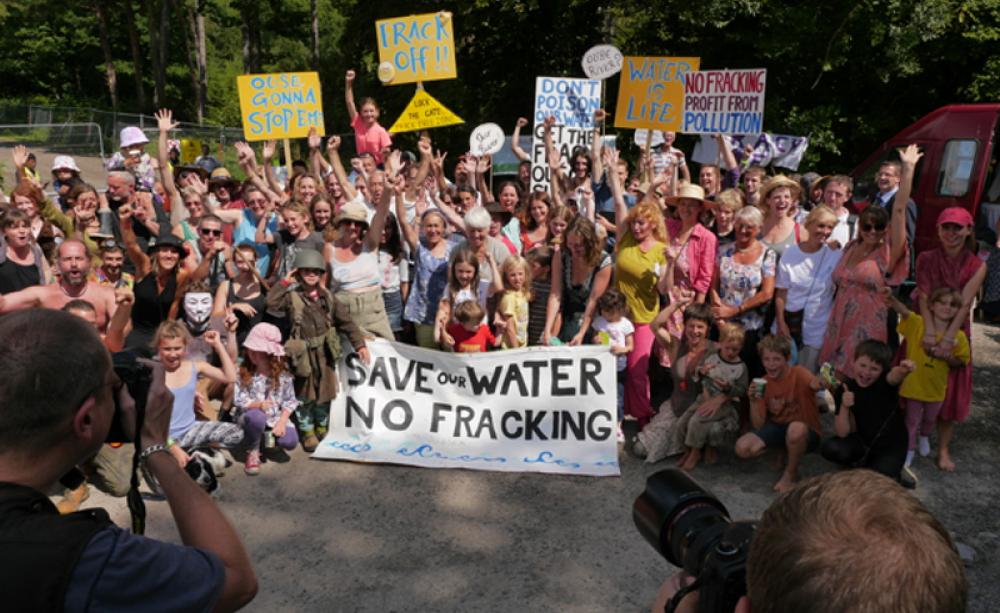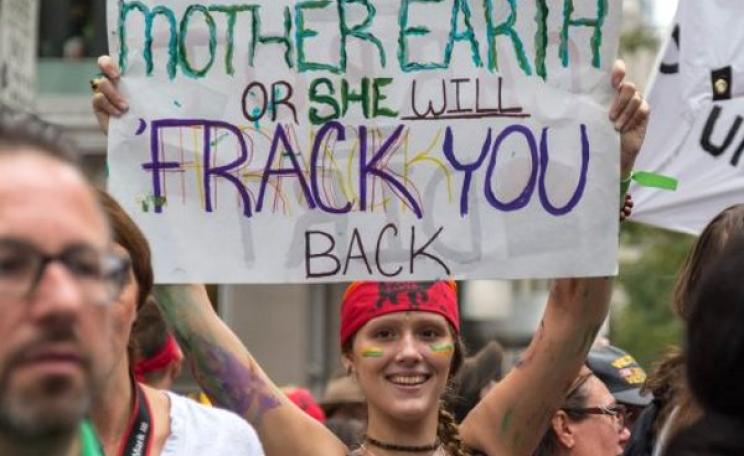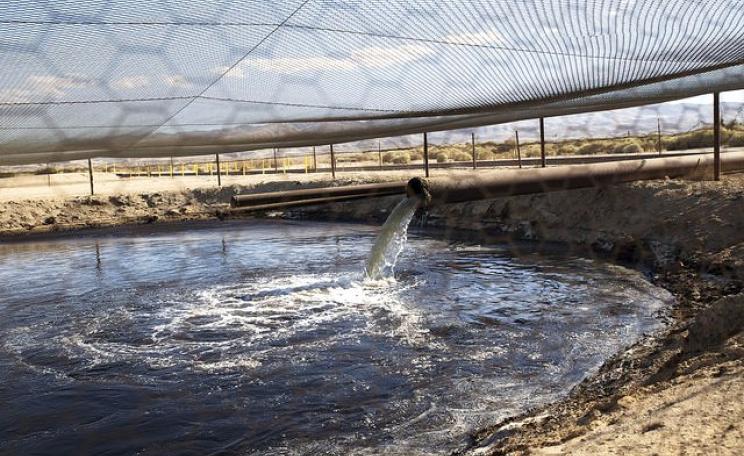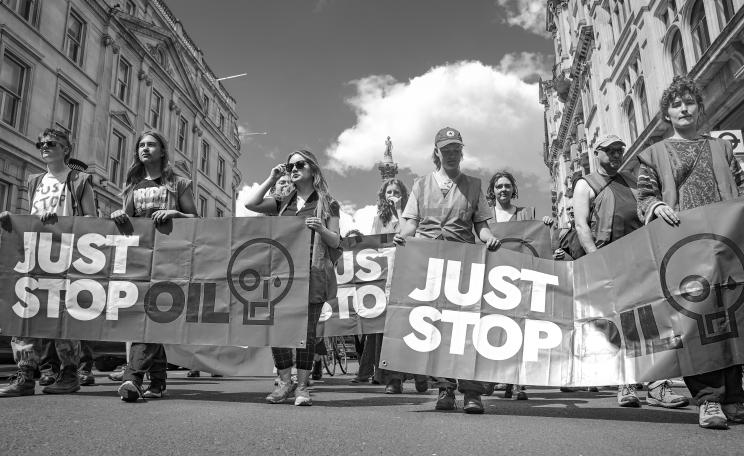Fracking is merely a stop gap measure for two to three decades before the global energy crisis really bites
Post-Balcombe what will the fracking landscape look like? Now that the stage has been set with community resistance and national support will the fracking prospectors be running scared or is the prize too great? Investors think it is; their opponents disagree and there is no meeting of minds which is why communities may hold the key in this protracted battle for our energy future. It won't be a case of what David Cameron says but instead what the people say when the drill arrives.
Cuadrilla have certainly taken a pasting in the publicity stakes and in what''s a long game, a five act play you might say, their co-conspirators, Dart Energy have also taken a PR hit with their plans for the UK's largest unconventional gasfield north of the border in Falkirk delayed by 12 months and counting thanks to successful campaigning by the Forth valley Against Unconventional Gas group (FAUG).
A leaked company document shows that in the last six months, the Australian company has had to cut its operating costs by 65%, resulting in loss of staff, board members and offices, as well as interests sold in Australia, Indonesia and Europe. Up to another 20% of operating cuts are planned in the rationalisation and in the meantime Dart is looking for UK partners with negotiations on-going but as yet no deals in place.
Ben Johns of UK anti-fracking group Frack Off has this to say: "What usually happens is that a company farms-in others to support it and then sells on the concern once it's up and running. The current bad publicity surrounding fracking in the UK is going to make it difficult for Dart to find partners. Centrica partnered Cuadrilla at Bowland Shale [their ill-fated fracking operation near Blackpool which saw two earth tremors in 2011] but that was before all the furore caused by Balcombe and it is unlikely another major name would want to run the gauntlet.
"Dart started out with a public listing of £310m it's now around £20m. In the boom days it was granted a £100m overdraft by shareholder HSBC, and its share price was Aus$0.92. These days shareholders can expect Aus$0.06, a 92% loss. And after 12 months of delay the planning process continues at a snail's pace through the Scottish government - while each month the company loses US$1.1m in operational costs."
More than 2,500 Forth Valley residents have now signed a Community Mandate that demands Falkirk council gives closer scrutiny to the scientific and anecdotal evidence of unconventional gas extraction risks while at the same time giving ‘proper consideration' to renewable energy alternatives. In Balcombe talk has been of Cuadrilla having no ‘social licence' to operate, with 85% of residents opposed to fracking.
Fracking is merely a stop gap measure for two to three decades before the global energy crisis really bites
In the wake of the 2,000 people-strong Reclaim the Power demonstrations and last week's arrest of Green MP Caroline Lucas, there has been even more bad news for the company in the form of a report authored by David Smythe, Emeritus Professor of Geophysics at Glasgow University. It claims that the Cuadrilla drilling operation is flawed thanks to inaccurate mapping, caused by inadequate 2D rather than 3D seismic profiling which has resulted in ‘poor interpretation of major fault lines'.
Balcombe residents' concerns relate to methane or toxic leaks into the nearby Ardingly Reservoir and the River Ouse, as well as worries that the structural integrity of the viaduct (built in 1841) carrying the London to Brighton trainline is in jeopardy. Prof Smythe states: "Previously non-seismic zones can be triggered by the injection of fluids into wells, but it is not yet known whether fracking in an area like the Weald, which is cut by many faults, could trigger shocks."
The risk of contaminated water alluded to in the same report is predicated on the frack shaft being only 500ft below the aquifer. If fracking goes ahead and the horizontal drilling were to cross one of the many Weald fault lines, the report warns that they could act as a channel for the contaminated frack water and dislodged methane to reach the local water table, the surface and the land beyond.
Fracking can only take place once the exploratory drilling ends at the end of September/beginning of October and the necessary permits and licences are in place. Cuadrilla has a drill schedule which sets out 40 days of drilling; two or three weeks of flow testing; then a week of remediation - i.e. making the site good. Having lost a week to direct action and its threat the company will now need to go beyond its planning permission deadline of September 28. The drill schedule already states October 6. So a West Sussex County Council planning meeting in mid-September is likely.
And with around 50 arrests and a policing bill of £2.3m since the Lock the Gate campaign began at the end of July, residents and protesters are in no mood for more drilling. Gwynevere, a druid from Hastings staying at the camp during the No Dash for Gas week said: "We need to take back the land. As spiritualists we believe the water is sacred, there are sacred springs and ley lines to defend."
For others there are matters more prosaic but of equal importance. An executive from the Kemps Farm Business Park who wished to remain anonymous said: "Getting to and from work each day is a nightmare you just can't get in or out if a truck is coming down the road."
The business park, which is 100 metres north of the site on the London Road, hosts IT company Interfuture and the somewhat ironically titled, Risk Factor Solutions. Trucks have a licence to come and go from 7am till 6pm Mon-Fri and and up until 1pm on Saturday. On average there are between three to five movements a day each flanked and preceded by campaigners.
Ewa Jasiewicz of No Dash for Gas told the local press: "Hundreds have been motivated to take direct action all over the UK. Caroline Lucas' arrest [Monday Aug 19] has empowered residents and given legitimacy to what we are doing."
The Green MP denied that the arrest was a ‘self promoting stunt' having spent five hours in Crawley police station before being released. She and her son have been bailed under section 14 of the Public Order Act on suspicion of obstructing the highway. The CPS will decide whether to charge her or not with an announcement expected in the coming week.
She has been to Balcombe several times and has supported residents and protesters alike. In a June talk in Brighton entitled Discover Your Inner Activist she described how she had been on anti-nuclear demonstrations and believed there were times when non-violent direct action was legitimate.
Balcombe has brought together some unlikely bed-fellows, a point picked up on by Jo Makepeace of radical UK direct action news sheet schNEWS: "There is a new tribe here. It has the creative foment and anarchy to it that the road protests had in the early days, it's characteristic of what happened then. For direct action environmentalists, it's instantly recognisable as the people who turned out for Twyford Down and Newbury: different people now of course: an eclectic mix of steam punks, green councillors, residents, anarchists all with differing attitudes to the police.
"You can't really quantify yet what Balcombe will become in this battle. Resistances like this don't spring up in a Marxist model of material conditions causing unrest, it's a similar recipe we've had before: Tory government bringing in austerity measures in a time of recession. Fracking has already been going on in the North West with this question of how are we going to fuel our country. Tory England is waking up to the fact that fracking is going to come to places like Balcombe, a rich, Telegraph-reading, NIMBY brigade who are against wind turbines as well.
"No-one gives a shit when fracking goes on in Blackpool but when it comes to Balcombe it divides the elite. Community is the most abused word in the English Language so it's difficult to say if community resistance is going to be the key here. If you put all of your trust unrelentingly in this dormitory village to London with a ‘don't frighten the horses' policy then you struggle: people want direct action then they don't. It's interesting that as far as we know there have been no public meetings organised in the more mixed Haywards Heath which is nearly as close to the frack site. The Reclaim the Power protest was just as necessary as the community resistance."
Some in the movement have argued it was even more so as solidarity stunts carried out during the six day camp (Aug 16-21) resulted in the shutting down of Cuadrilla's HQ in Lichfield and PR firm Bell Pottinger in London for part of a day.
Other campaigns that have been gathering equal steam include REAF (Ribble Estuary, Lancashire), RAFF (Blackpool area, Lancashire), The Vale Says No (South Wales), No Fracking in Sussex, Kent, Scotland and Northern Ireland. And here protests have been going on a lot longer against iGas for example, which has a site on the Wirral Estuary that it has been fracking for two years, more advanced than even Cuadrilla.
Although it is Cuadrilla's four wells (with a 50% failure rate: one of the four caused the two 2011 earthquakes, another broke) near Blackpool which continue to grab the local headlines.
In February - more than two years after the tremors which forced fracking's short-lived moratorium, - a resident of Lytham St Anne's complained on a local forum that: "water was off again due to collapsed mains. I have also noticed that there have been several collapsed sewers in St Annes over the last few months. Seems a big coincidence because the area has been drilled by the frackers and I would guess that this has made the ground liable to collapse."
Following this thread, a geologist and a drilling engineer were consulted and both agreed it very likely that the vibrations caused by the drilling contributed to collapsed mains and sewers, especially as the ground had been wet for months.
Such concerns in Europe and beyond have led to outright bans in Bulgaria and France both of which at the time of banning said the block would remain in place until there was proof that shale gas exploration won't harm the environment or "massacre" the landscape. Germany bans fracking near reservoirs, and it's been stopped in Austria and Sweden due to ‘economic unviability'.
But it's the purported ‘economic viability' which wins the day in the UK and Europe as a whole however. Despite the International Energy Agency (IEA) warning that on current form we're on target for an unsustainable 6C temperature rise by 2100, shale gas is branded as a green, low carbon energy when it is a fossil fuel same as any other. And the gains of switching from coal to gas-fired power stations are seemingly illusory, as they last 25 years and still pump CO2 into the atmosphere owing to carbon capture technology remaining on the drawing board.
The same could be said for the UK regulations when it comes to fracking, according to Johns of Frack Off. "There are 3,000 wells in the UK, 200 have been fracked, not horizontally though, mainly vertically. With well leaks an accepted risk in the industry [with around 6% leaking immediately and 50% during their 30 year lifespan] what are well failure rates in the UK? There are no figures we can find and no specific regulations yet for fracking. It's frightening especially when you think fracking is merely a stop gap measure for two to three decades before the global energy crisis really bites."
Talking economic viability alone would translate in Balcombe to 4 wells per sq mile leading to 32 within parish boundaries and 1,200 in Cuadrilla's Sussex licence blocks. The Weald could end up looking like a Swiss cheese and as for the much vaunted community benefits put forward by the Department of Energy and Climate Change (DECC) of £100,000 for each well and 1% of revenues at production stage, this would only apply to the smaller companies and not the giant corporations most likely to take over.
Francis Egan, Cuadrilla's CEO, appears dismissive of concerns about over development and claims, "100 sites equal just 2 sq km of land"... and "with sites suitably screened by trees they would be invisible to passers by". And pointing to the UK's target of 80% reduction in greenhouse gases by 2050 he further states: "gas is a much more benign fossil fuel than coal and highly regulated over here...The US increased gas and renewables and reduced CO2." (A moot point as renewables are dwarfed by fossil fuels in US primary energy use: lying second from bottom of the list at 9% with nuclear at 8% while natural gas/coal and oil tip the scales at 81%.)
Meanwhile back in Balcombe the Parish Council has now stated it too will oppose any application for fracking at the site. Which all suggests there could be more trouble ahead...
Jan Goodey is a freelance journalist writing on environmental issues.
All images courtesy of Frack Off.
| READ MORE... | |
 |
NEWS ANALYSIS Green MP Caroline Lucas arrested in Balcombe anti-fracking protest The UK's only Green party MP was arrested yesterday along with dozens of anti-fracking protesters in a 'day of action' across the UK |
 |
NEWS ANALYSIS Fracking will meet resistance from southern nimbys, minister warns Michael Fallon's comments in private meeting herald shale gas exploration from Hampshire to Kent that risks putting Tories on collision course with heartland support |
 |
NEWS ANALYSIS The UK's anti fracking movement is growing As fracking hits the headlines UK protests against the practice of blasting natural gas from shale rock are on the increase. Jan Goodey reports on the latest flashpoint in the urgent - and escalating - anti fracking battle |
 |
NEWS ANALYSIS Tar sands blockaders: an insider’s story What’s it like to stop the talking and put your life on the line for what you believe in? Activist and reporter, Eric Moll, has joined the Tar Sands Blockaders who have been protesting over the laying of TransCanada’s XL Keystone pipeline in Texas since April. Here he reveals just how brutal the authorities are with the ‘hippies’ protesting over the corporation’s damage to the environment |
 |
NEWS ANALYSIS Anti-extraction movement in the US gains momentum Protests against fracked-gas pipelines in Pennsylvania and New Jersey are part of a growing movement of direct-action resistance to extraction. Insider Eric Moll reports from the Frontline of the resistance |








